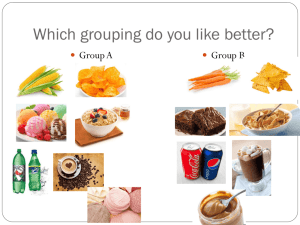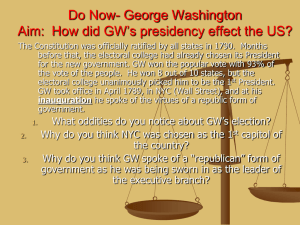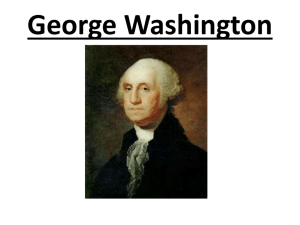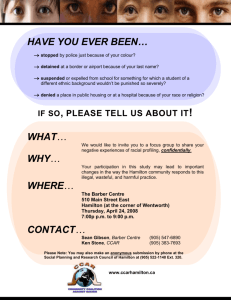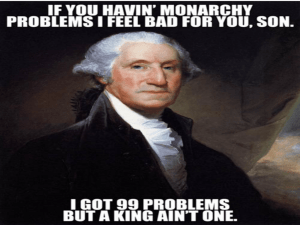Do Now- George Washington
advertisement
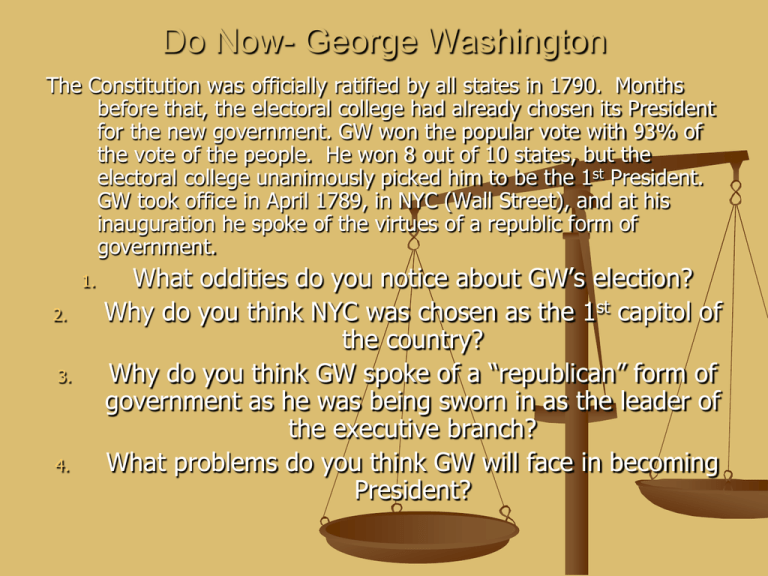
Do Now- George Washington The Constitution was officially ratified by all states in 1790. Months before that, the electoral college had already chosen its President for the new government. GW won the popular vote with 93% of the vote of the people. He won 8 out of 10 states, but the electoral college unanimously picked him to be the 1st President. GW took office in April 1789, in NYC (Wall Street), and at his inauguration he spoke of the virtues of a republic form of government. 1. 2. 3. 4. What oddities do you notice about GW’s election? Why do you think NYC was chosen as the 1st capitol of the country? Why do you think GW spoke of a “republican” form of government as he was being sworn in as the leader of the executive branch? What problems do you think GW will face in becoming President? What differences do you notice between the 2 painting? How does this show the fear that some had of Washington becoming President? Aim: How did GW’s Domestic Policy effect the US? GW Background Rich plantation owner (one of the FFV’s) Owned 318 slaves Revolutionary War general No political party affiliation Served in House of Burgesses, but never wrote any major laws President at Constitutional Convention, but only spoke once and very limited political experience Based on this background, was GW the right choice to be the 1st President of the US? GW DOMESTIC POLICY DOMESTIC- AT HOME The Cabinet Group of advisors…. Why called the cabinet??? Organize the various levels of bureaucracy VP- Adams Sec. State- Jefferson TreasuryAlexander Hamilton War- Henry Knox Attorney General- Randolph Judiciary Act 1789 Establishes Supreme Court with 6 judges 13 Judicial Districts and circuit courts within each district Economic Woes National government under the Articles were $54 million in debt Individual States owed $21 million Should the new government absorb the debt of the old government? Should the national government assume the debt of the states? Hamilton’s Financial Plan Assumption- Hamilton decides to assume the debt of the old government and offer bonds in the new government and pay off the state debts…. Why??? Makes the new government look strong Paying off the states debt would tie them to the national government Any creditors that helped in paying off debt would be linked to the success of the new government (merging of the rich and the politicians?) Different states owed different amounts!!! Most southern states had already paid off their debts!!! So to appease them, Hamilton convinced TJ to accept moving the capitol to the South. Federal City (later Washington D.C.) located on Potomac River Hamilton and the Bank Hamilton persuades the government to create a National Bank Positives Sound currency Place to store newly collected tariffs Get the rich on their side Negatives Business and gov’t tied together Self interest?? Corruption?? Bank Charter to operate for 20 years Is the Bank Legal?? Jefferson vs. Hamilton TJ says nothing in Constitution about a National Bank Hamilton uses the elastic clause Congress can make “any laws it feels is necessary and proper” Loose Constructionists vs. Strict Constructionists!!!! Start of the 2 original political parties Federalists 1st vs. Anti-Federalists political party system Federalists vs. Anti-Federalists (Hamilton) (Jefferson) strong central govt power in state and local Educated, rich elite rule democracy of virtuous farmers Fear or mob rule fear of absolute power Loose interpretation <Constitution> Strict interpretation Pro-Bank Bank is illegal and favor rich Manufacturing society Agriarian Society Bankers, lawyers, NE <Supporters> farmers, small tradesmen Whiskey Rebellion Hamilton tried to start reducing the debt by collecting tariffs 1st tax was on whiskey Pa. farmers complained about the tax and started protests and refused to pay If you were in charge, what would you do???? Hamilton convinced GW to send in the military!! 13,000 troops (led by GW himself) sent to crush rebellion Most scattered when they saw huge army 3 killed Was this the right move by the government???? Shows strength of govt If they let this tax go, they will just whine about the next one George Washington’s Domestic Policy WHAT HAVE YOU NOTICED THAT IS ODD ABOUT EVERYTHING WE HAVE TALKED ABOUT TODAY REGARDING GW’S DOMESTIC POLICY???? HAMILTON BASICALLY IS THE DOMESTIC POLICY Washington Foreign Policy Foreign policy- relations with other nations French Revolution How do you think the Rev. will affect the US? Divided country a. Federalists wanted to aid England b. Anti-Federalists supporting their “eternal friendship” US pride that they are using our “model” Reign of Terror and European War More people in US started to side with England Affect on trading? GW’s Proclamation of Neutrality o US will stay neutral from all foreign affairs with Europe o Why he issues it? o US IS WEAK!!!!!!!! o We got our own issues o England would’ve just blockaded us, preventing us from trading Problems with England Instigating the natives Still on our western lands Disruption of trade? Impressment and Seizures taking US soldiers and ships, claiming they are runaway British sailors US gets Jay’s Treaty Repayment of previously damaged ships Promise to leave the western forts Recognition • England • Still gets owed $$$$$ from past debts Effect of Jay’s Treaty England never leaves the forts England continues to seize US ships England threatens blockade of West Indies GW popularity suffers Pinckney’s Treaty • US and Spain • US gets • Rights to Mississippi River • Use of Port of New Orleans • Clear border of Florida • Why US gets such a good deal??? • a. Spain afraid of US-England alliance • b. Shows deterioration of Spain’s power Washington’s Farewell Address Policy of Isolation and Neutrality Steer clear of permanent alliances 2 term precedent US gov’t shouldn’t borrow $$ from other countries and have any debt Beware of political parties/ factions Avoid sectional conflicts in the US Importance of Constitution/ checks and balances/separation of powers
